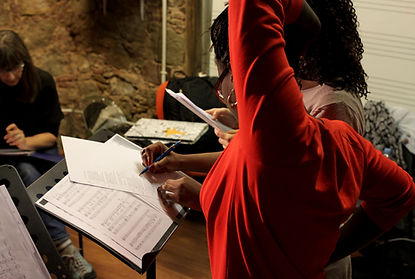Musical Theatre and Modern Music by Viv Manning
Voice training for actors and singers of various styles.
The Singing Department for Musical Theatre and Modern Music in Eòlia includes training in vocal technique and music for musical theatre and an eclectic variety of other styles. Exploring musical performance, phrasing, sonority and the dynamics of the voice, this variety aims to broaden the student’s awareness of the possibilities of the vocal instrument. It is an approach that also reflects the variety of styles required of the contemporary musical theatre performer. The curriculum seeks to provide students with a solid foundation for developing their personal sound, express themselves with fluidity and authenticity, and at the same time understand how to take care of and make the most of their voice.
“If you copy, it means you’re working without any real feeling. No two people on earth are alike, and it's got to be that way in music or it isn't music.” Billie Holiday
In addition to studying music, a singer’s training involves physical training, not just of the vocal instrument but also of the body in general. The singer is his or her own instrument. The development of body awareness is the foundation of a singer’s training. In the voice classes we work on this relationship between the body and the voice to train the spoken and singing voice. The vocal instrument depends on the breath, and the administration of the breath depends on the body. The source of sound is also the source of emotional expression. The vocal instrument is particularly sensitive to changes in emotional states, nervousness and energy levels. These changes are ‘natural,’ but they can manifest in muscle tension that affects the respiratory system or directly affects the vocal instrument. Training will prepare both actors and singers to manage these changes and strengthen their instrument.





